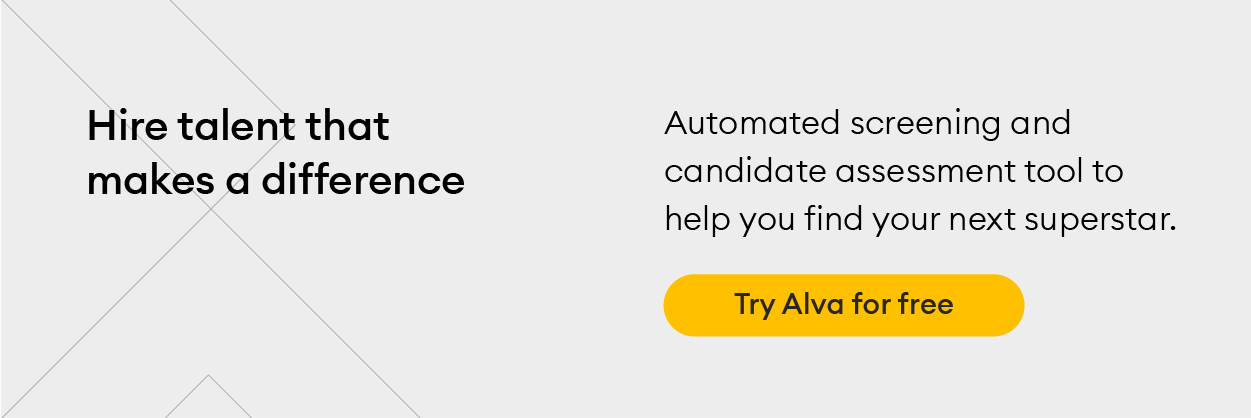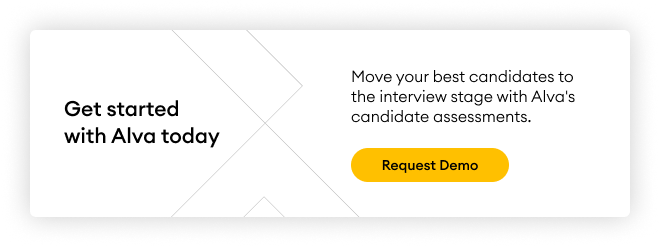You have the candidate’s CV in front of you as you conduct the interview. You also have the standard set of questions you’ve pulled from Google. Where do you want to be in five years? What is your biggest weakness? And then your trick question to catch them out—do you believe in aliens?
Throw in some small talk, and that’s it. Interview done. The candidate seems good enough for the job. They sign the offer and you sink back into your seat. What a relief!
Fast forward a month into the new hire’s role, and mistakes crop up. Your new hire messes up a big task. They openly complain about the job to other coworkers. They start showing up late to meetings and are calling in sick.
That interview wasn’t a good way to assess their role fit, after all.
The truth is, interviews can be tough, and hiring mistakes can have serious consequences for your organisation. But don't worry—there's a better way to conduct interviews. In this guide, we'll show you how to transform the interview process into a powerful tool for finding the right candidates and avoiding costly hiring errors.
How to prepare for an interview with candidates
The magic happens before the interview. Here are several things you can do to prepare yourself for an interview with candidates.
Map out the role first with the hiring manager
Begin by hosting a startup meeting with the hiring manager to clarify role requirements and necessary attributes for the position. This crucial step should take place before you write the job description and develop interview questions.Essential questions to discuss in the meeting:
- What is the purpose of this role in the organisation?
- What unique contributions do we expect this candidate to make?
- What are the role requirements?
- What characteristics define success in this role?
- What skills must the candidate possess?
- How will we evaluate candidates?
- What criteria indicates success in the role?
Additionally, guide the hiring manager through what a good interview looks like. For instance, let them know which questions they can ask, which ones to avoid, and how to assess the answers to those questions. If it’s the hiring manager’s first time conducting an interview, consider offering a training session and briefing them on evaluating answers.
After this meeting, you should have a well-defined plan that states the purpose of the interview, assessment criteria, and interview structure.
Pro tip: Refer to your blueprint plan when identifying and evaluating candidates. This will make your life 10 times easier, especially when you’re assessing candidates’ responses during the interview. You simply need to refer to this plan to see if the candidate matches the requirements profile and list of attributes you’ve set up with the hiring manager.
Know what good looks like before interviewing candidates
Efficiently conducting interviews starts with selecting top-tier candidates. But relying solely on CV screening may not yield the best results. And you’ll waste a lot of time reviewing CVs that do little to predict a candidate’s ability to perform on the job.A more effective way to shortlist your candidates is to consider using a candidate assessment tool. This approach helps streamline the selection process, ensuring that you focus on interviewing individuals with the highest potential for success in the role.
For example, with Alva’s candidate assessment platform, you can spot the best candidates to engage with, and select candidates with the highest potential to progress to interviews.
How it works:
- Use psychometric assessments to evaluate all candidates on the same objective parameters
- Hiring for highly complex, technical roles? Use Alva’s built-in coding tests to find your next engineering talent
- Identify candidates with the best role fit, and quickly shortlist them for interviews
- Use Alva’s Interview Templates to easily conduct your interviews

Prepare your interview questions in advance
Before meeting your candidates, you need to know exactly what you’re looking for in a new hire. That will enable you to ask the right questions during the interview. Fortunately, you should have your blueprint document set up in the startup meeting. Use this to create your list of questions, and remember, the interview questions must be specific to the role you’re looking to fill.Focus your interview questions on:
- Assessing the candidate’s genuine interest in the role and company
- Delving into their work history and past behaviours related to their experience
- Evaluating whether they possess the skillsets and competencies for success
- Gauging their potential as a cultural fit whether they’d be a good cultural fit (though this shouldn’t be your top priority)
Pro tip: Quality over quantity! It’s an easy way to burn through the interview time, and it can leave your candidates’ feeling exhausted and frustrated. Instead, narrow your list to eight to 10 carefully chosen questions that effectively reveal the candidate’s capabilities and potential.
Set up interview scorecards to evaluate candidates' answers fairly
Now that you have your list of stellar interview questions, you’ll need an evaluation sheet so you can assess candidates’ answers and weigh them against the role requirements. Also called interview scorecards, this acts as the interviewer’s compass, enabling them to understand what interview answers are deemed successful, which aren’t, and how to fairly score responses.When creating your interview scorecards, ensure you:
- Have a consensus on what compromises success before interviewing candidates
- Establish a consistent and objective assessment of candidates you will carry out with every hire
- Create a methodology for rating questions so you can ensure open and constructive dialogue across HR and hiring managers.
How to prepare the candidate before the interview
Your priority as the interviewer should always be to set the candidate up for success. That includes informing candidates about what they can expect from the interview, and what the purpose of the interview is. For example, if you’re asking situation-based questions, you can let them know in advance so they can best prepare for the interview.Here are some quick tips on how to do that:
- Be clear about who they will meet
- State how long the interview will be
- Leave room for questions and encourage candidates to prepare them in advance and ask questions during the interview.
- Outline what candidates can expect from the interview
- Explain why you’re doing what you’re doing (if it's situation-based interview questions)
Key takeaway: According to Alva’s Talent Acquisition Manager, Lisa Sindsjo Grahn, it all goes back to your purpose for conducting the interview.
How to conduct an interview
Now that you’ve prepped ahead, it’s time to ace the interview! Here’s how to conduct an interview effectively.
Involve only a few others when interviewing candidates
When making any big decision, it’s important to have multiple people weigh in. You don’t want 10 people weighing in on a potential hire as this can quickly derail you from making a decision. Rather, select between two to three relevant people to help you interview candidates.This includes having at least the following three people in the interview process:
- The talent acquisition manager
- Hiring manager
- Team lead
- And/or someone more senior.
At Alva, we usually have the Talent Acquisition Manager do the first interview, followed by a second interview with the hiring manager and team lead. Sometimes, we also involve someone higher up if it’s a senior role. This really depends on the role itself.
Assess potential
The question is not just about whether this person can do the job today, but whether they can do the job a year from now in the event of key company or market changes. Ask the candidate how they learn and what their thoughts are on where your industry is going.
Moreover, try and hire for the type of organisation you are. For example, if you’re a fast-growth scaleup, looking for skills where the candidate can adapt, multi-task, and pick up tasks with little supervision are essential. Equally, for larger corporations, you would want someone who is organised, diligent, and can follow protocol.
Consider hiring for skills, not years of experience
Skills-based hiring is on the rise, and for a good reason. Companies are increasingly focusing on candidates’ competencies and skillsets rather than their credentials. Indeed, LinkedIn recently reported a 21% increase in job openings advertising skills and responsibilities instead of qualifications and requirements. What’s more, the number of positions that don’t require a degree jumped by nearly 40%.
What this shows: Organisations are increasingly favouring skill competency over formal education. So how can you assess candidates’ competencies in the interview room? Start by asking questions that reveal how a candidature has behaved in past roles. This will be a tell-tale sign of how well they will behave in the job role.
Ask for real examples and solutions
Don’t waste time in the interview by asking questions without substance. A classic question you should avoid is “What is your biggest weakness?”
You might as well encourage the candidate to bluff! Instead, always stick to factual-based questions that will indicate how the candidate handles real situations related to the job in question.
Consider cultural fit, but it's not everything
While it’s important to see whether a candidate would feel comfortable at your organisation, it’s not everything. Instead of assessing for biased qualities such as friendliness, look for how the candidate would orient themselves at the organisation.
Is this person a long-term planner or a short-term thinker? Is this person proactive or reactive? Do they prefer to collaborate or work independently?
It’s important to keep in mind that the candidate’s disposition doesn’t mean they’ll be able to adjust to a new culture. Rather, the question should be focused on: can they adjust? For example, if hiring for a startup role, you want to test for qualities that indicate the person is agile, comfortable with change, and can adapt to a changing environment.
How to use personality assessments to screen for culture fit: Some personality assessments like Alva’s – which is built on the Five-Factor Model – allow hiring teams to discover the personalities that will help them thrive in key roles. Using decades of research, you can use personality assessments to find the right personality profiles for your most important hires.
Promote the role and company authentically
It’s a given that you should allocate some time to selling the role and company during the interview. However, there’s a fine line between highlighting key perks and overselling a dream or promise that doesn’t match reality.When selling the role and company, keep the following in mind:
- Paint an accurate picture of the work environment and responsibilities the candidate will face.
- Communicate as much information as possible about your company’s culture, mission and values
- Describe your company’s trajectory and how the candidate can be a part of its growth.
- Talk about your product or service and highlight any exciting updates and developments
Takeaway: Taking some time to talk about your company’s key perks can enable your candidate to form a positive impression of your employer brand, framing their overall experience with your hiring process.
Tips on providing candidates with a positive interview experience
In a candidate-driven market, interviewing candidates has become a two-way street, with candidates assessing companies as much as companies are assessing candidates. Consider the interview as the face of your business. Your job is to ensure candidates connect with your company and the role. You can do that by creating a positive interview experience.
87% of talent say a positive interview experience can change their mind about a role or company they once doubted.
- Foster a welcoming space for candidates, one that reduces stress and makes them feel at ease.
- Validate the candidate’s feelings (not everybody reacts the same way in an interview). As an option, you can even acknowledge that it’s ok to be nervous
- Focus on relevant, non-intrusive questions that pertain to the role.
- Be present during the interview and pay attention to the candidates’ responses
- Let candidates speak – your job is to listen
- Don’t ever ghost candidates! It shines a negative light on your company, and can harm your employer branding.
Lisa’s takeaway:
Want to do a deeper dive? Check out this guide on creating a candidate-friendly interview.
Checklist for interviewing candidates
- Put your phone away and close down your apps to minimise distractions
- Make eye contact. If conducting the interview virtually, look at your camera
- Introduce yourself and whoever is in the interview with you
- Build rapport by making small talk at the beginning
- Ask your questions one by one and let the candidate talk
- Take notes, particularly if you’re using interview scorecards to evaluate candidates’ responses
- Listen actively and use facial expression that show you’re listening (like nodding)
- Leave time for the candidate to ask questions
- Follow up with a thank you email and advise on next steps
Alva's Interview Templates
Alva's Interview Templates give hiring teams the tools to consistently structure, guide, run, and score high quality interviews. Use the templates to create the perfect question flow, ask competency-based questions, and measure the right things.-
- Create the perfect interview for your needs
- Keep your interview fair and unbiased
- Easily keep track of the interview and candidate scores with everyone in your organisation

How to follow up after the interview
You’ve done your interview, congratulations! What comes next?Here are some things you can do after the interview:
-
- Leave candidates feeling pleasant after the interview. This includes thanking them for spending time with you in the process!
- Reflect on the whole interview as an experience, and if needed, take extra notes.
- Confer with the hiring manager on the best candidate to move forward with, and compare scorecards if needed.
- Either invite the candidate to the next round of interviews or if it’s the final interview, make an offer.
- Provide feedback for all interviewees no more than two weeks after the interview
How to create a structured interview process
Structured interviews are twice as effective at predicting job performance than traditional interviews. By using structured interviews, you can minimise unconscious biases, ensuring a fairer and more accurate hiring process.
The difference between structured vs unstructured interview
A structured interview is a scientific method of assessment that evaluates how competent a candidate is for the job role. All candidates are asked the same questions, and are compared against the same criteria.
In contrast, an unstructured interview is one where the conversation is free-style and the interviewer asks whichever questions come to mind. For example, “tell me your greatest weakness” could be perceived as an unstructured question, since it doesn’t relate to the job role in question, and does nothing to indicate how job-ready the candidate is.
During an unstructured interview, interviewers usually lead by gut feeling alone, and ask a set of unprepared, random questions. Therefore, this isn’t the most reliable way to assess candidates.
The power of situation-behaviour-result interview questions
Situation-behaviour-result (SBR) interview questions ask candidates to elaborate on real-life situations they encountered in the past. These questions are designed to evaluate how a candidate will perform in the future and whether they possess the necessary competencies for the role you’re hiring for.According to research, SBR interviews outperform the conventional ones in terms of reliability and predictive validity. In other words, they’re one of the most effective methods for selecting candidates.
With situation-based questions, consider these tips:
-
- You must present a number of job-related situations, and ask how the candidate would/has behaved in the past.
- Look out for intention-this predicts behaviour
- When asked right, these questions offer valuable insights into job performance potential.
Examples of behavioural interview questions
Here are some examples of behavioural interview questions you could consider asking all candidates.
1. Tell me about a time you worked effectively under pressure.
Why ask this question: If you’re being considered for a high-stress job, the interviewer will want to know how well you can work under pressure. Give a real example of how you’ve dealt with pressure when you respond.
2. Have you ever made a mistake? How did you handle it?
Why ask this question: Nobody is perfect, and we all make mistakes. The interviewer is more interested in how you handled it when you made an error, rather than in the fact that it happened.
3. Give an example of a goal you reached and tell me how you achieved it.
Why ask this question: The hiring manager is interested in learning what you do to achieve your goals, and the steps you take to accomplish them.
4. What do you do if you disagree with someone at work?
Why ask this question: With this question, the interviewer want sto see how you handle issues at work. Focus on how you’ve solved a problem or compromised when there was a workplace disagreement.
What interview questions to avoid
Questions to avoid include:-
- Hypothetical scenarios that don’t tell you what you need to know about the candidate
- Questions related to age, gender, background
- Personal questions that can result in confirmation bias
Steer clear of questions unrelated to the job description. To ensure fairness and objectivity, ask all candidates the same set of questions.
The impact of structured interviews on hiring success
Structured interviews can be a game changer for your hiring process and the candidate experience. Here’s how:
Benefits for the employer:-
- Improved job performance prediction- structured interviews better predict a candidate’s job performance
- Reduced confirmation bias- by asking candidates the same questions and using the same evaluation criteria, you’re reducing the risk of bias.
- Data-driven decisions- standardised criteria enable decisions based on facts, not intuition.
- Reducing time-to-hire and having a structured framework helps hiring teams interview candidates more efficiently and make strategic decisions.
-
- Fair assessment of skills and competencies relevant to the role
- Equitable interview process ensuring equal opportunities for every candidate
- Outcome-oriented interviews, optimising time spent with the hiring manager
Key takeaways
-
- Go through your introduction, and make sure the candidate feels ready for the interview. This includes repeating the expectations and purpose of the interview.
- Establish rapport with candidates
- Mention the company and role either before you ask the questions or after.
- Treat all candidates fairly, even if they might not be a good fit for the role
- Be transparent- avoid implying the candidate will advance if uncertain
- Always leave room for candidates’ questions
Alva's Interview Templates
An interview is one of the most predictive methods of assessing candidates, and as champions of data-driven recruitment, why not try our Interview Templates feature? This powerful tool enables you to consistently structure, guide, run, and score high-quality interviews, ensuring that you make the best hiring decisions every time.







